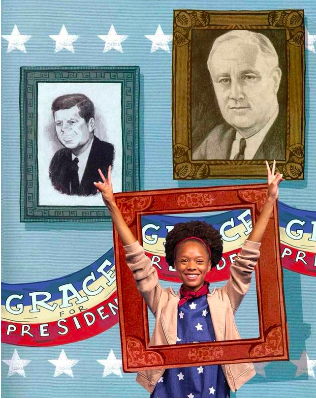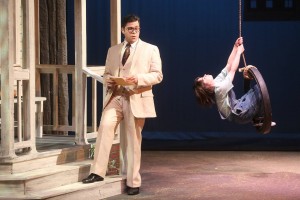
Despite the fuss made over Hillary Clinton, Grace Campbell was the first female to declare an interest in being president in 2016. We’ll find out how she does well before November.
She’s the third-grade heroine of “Grace for President,” the musical Children’s Theatre of Charlotte commissioned and will open next week. (School performances precede the Oct. 21 opening to the public.) It’s a world premiere, though CTC allowed Aurora Theatre in Lawrenceville, Ga. to do two public performances last weekend.
Back when Clinton’s candidacy was still a rumor – a likely rumor, but not confirmed – CTC artistic director Adam Burke hired Joan Cushing to write book, music and lyrics for this show. She’d done “Ella’s Big Chance” for CTC and happily dug into the story of Grace, which started life as a picture book by Kelly DiPucchio and illustrator LeUyen Pham.
It depicts the race between practical, down-to-Earth Grace and Thomas Cobb, who attains popularity by making inflated promises he can’t keep. Any similarity to the current “adult” race remains accidental, as Burke and Cushing were discussing this idea in 2014.
“We thought it would be a perfect fit for the election season of 2016,” says Burke. “Joan had a career for years as a political satirist in Washington – she played the piano (in revues) as Mrs. Foggybottom – so who better to write a musical that explains the electoral system?” Michelle Long, CTC’s director of education, will helm the show.
The kids in Ms. Barrington’s class all represent a state in the election. Not to give the ending away, but it comes down to the three electoral votes of Wyoming – which elected the first female governor in U.S. history, Nellie Tayloe Ross, in 1924.
Grace’s African-American heritage also seems timely to Burke, not just because we have a black president now but because “what’s happened in Charlotte recently has made this story relevant. It’s important for us to provide offerings that represent the whole community.”
Yet the message, he says, is less that girls can serve capably or even that African-Americans should have a hand in running the country. It’s more that “you should vote for the person most qualified to serve, whoever it may be. Vote not for what they are – Republican, Democrat, man, woman – but what they stand for.”

